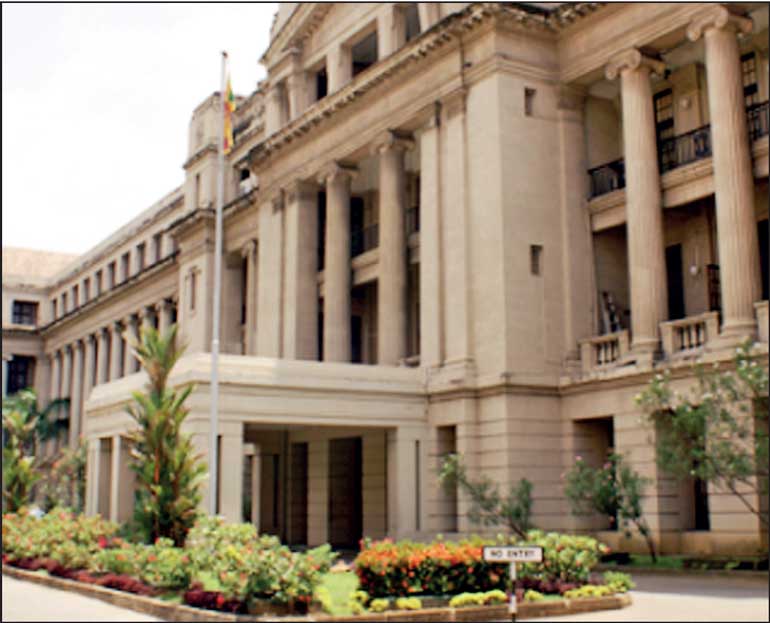Friday Feb 20, 2026
Friday Feb 20, 2026
Friday, 2 February 2024 00:00 - - {{hitsCtrl.values.hits}}

Ministry of Finance
The Standard Chartered Bank (SCB) yesterday joined an apparent growing chorus of concern over the delay in wrapping up Sri Lanka’s External Debt Restructuring (EDR) giving credence to similar sentiment expressed by global private creditors as exclusively reported by the Daily FT on Wednesday.
SCB’s Global Research in a credit alert released yesterday, said an agreement with bilateral and commercial creditors in 2Q is crucial ahead of Sri Lanka’s election period beginning 3Q.
SCB said investors are keenly focused on progress on Sri Lanka’s commercial debt restructuring after the successful completion of the IMF’s first review under the current Extended Fund Facility (EFF). It recalled that at the post-visit press briefing in January, the IMF acknowledged Sri Lanka’s reform commitment, as well as the improvement in external and fiscal fundamentals. At the same time, it urged Sri Lanka to conclude bilateral and commercial debt restructuring soon, preferably before the second review, which we think is likely in Q2.
“Progress on commercial debt restructuring has been slow,” said the SCB Global Research Credit Alert. “After Sri Lankan authorities rejected the Ad Hoc Group of bondholders’ Macro-Linked bond proposal in October, no new proposals have been put forward by either party,” SCB added. “That said, the Central Bank of Sri Lanka governor said at the January post-MPC briefing that discussions are ongoing, and agreements would be reached in due course,” it said.
SCB also referred to recent local media reports suggesting that the bondholder group is disappointed by the Government’s lack of urgency in actively engaging with bondholders and discussing restructuring proposals. See Daily FT report on Wednesday titled “Govt. compromises credibility among global ISB holders” https://www.ft.lk/top-story/Govt-compromises-credibility-among-global-ISB-holders/26-757978
SCB said in December the Ad Hoc Group of Bondholders’ press release had also expressed disappointment in the lack of transparency from Sri Lankan authorities and bilateral creditors on the terms of their restructuring, which the bondholders feel puts them at a disadvantage in relation to restructuring negotiations.
“We think investors want an early agreement, preferably in Q2-2024, ahead of Sri Lanka’s election cycle from Q3 onwards. The Presidential election is due before November 2024, followed by parliamentary elections, likely in late Q2 or early Q3-2025. We think the authorities would be reluctant to announce commercial debt restructuring agreements close to election dates given the likely political ramifications of a deal. Therefore, if there is no agreement by end-Q2, it is highly likely that the restructuring will be delayed by at least six months until a new president takes office by end-2024,” the SCB Global Research Credit Alert said.
SCB does not think there is a strong incentive for the Government to conclude commercial debt restructuring in a hurry. “While the IMF has urged Sri Lanka to conclude restructuring quickly, a lack of a restructuring agreement with commercial creditors may not hinder completion of the second IMF review. Sri Lanka’s current external situation is comfortable; it is running a current account (C/A) surplus. Thus, the urgency on the part of bondholders to conclude an agreement puts Sri Lanka in a better bargaining position to negotiate larger concessions from the group with regards to the commercial debt restructuring,” SCB emphasised.
That said, the stay granted on the lawsuit filed by Hamilton Reserve Bank against Sri Lanka will be lifted at end-February 2024, raising the prospect of litigation risk against Sri Lanka again.
SCB Credit Alert said it expects Sri Lanka’s external position to improve further in 2024, despite a likely deterioration in the Current Account to a deficit of 1.5% of GDP. A wider trade deficit, as growth picks up, would likely be partially offset by stronger tourism and remittance flows.
“We think $ 1.3 billion of the C/A deficit could be financed using FDI and multilateral inflows. The IMF has set an FX reserve target of $ 5.3 billion for end-2024, up from
$ 4.4 billion as of end-2023. We think this is achievable and expect FX reserves to improve gradually, as long as Sri Lanka successfully completes the two IMF reviews scheduled in 2024 and external debt service remains in check,” SCB said.
SCB Global Research has adjusted its recovery values to account for accumulating past-due interest (PDI) until June 2024, given our expectation that restructuring could be concluded in Q2-2024. “We had previously lowered our base exit yields to 11% given the improved market outlook for Single-B/CCC credits as well. These adjustments increase our recovery value to the 50-65 range, assuming a 13-9% exit yield range. At our base 11% exit yield, the recovery value would be 57. For more details on our bond structure, see Sri Lanka – The first proposal, but not the last,” SCB added.